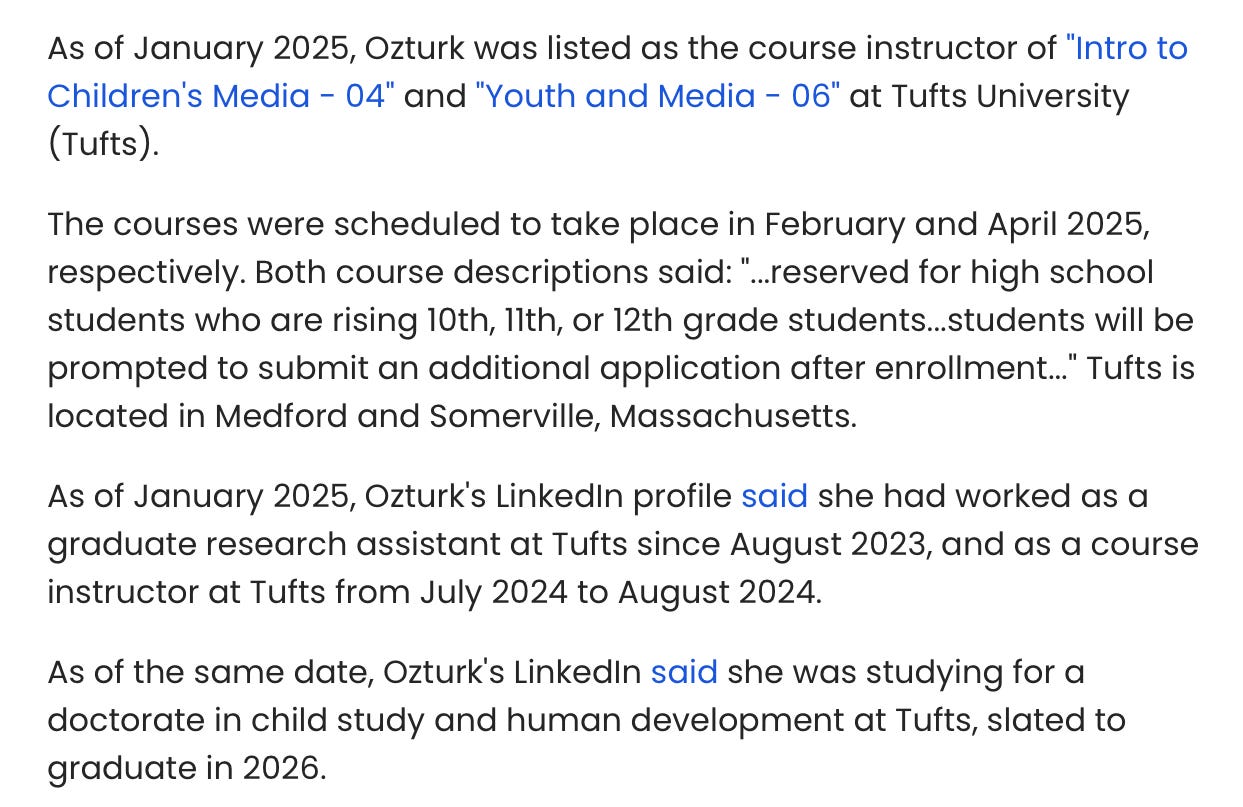The Anti-Speech Deportation of Rumeysa Öztürk
The video is chilling. Six people in street clothes, presumably agents of Immigration and Customs Enforcement (ICE), surround a young woman, take her phone and backpack, handcuff her, and hustle her to an unmarked SUV. In minutes, she’s gone.
Later that night, a Department of Homeland Security spokesperson said the young woman—Tufts graduate student Rumeysa Öztürk—had been arrested because she had “engaged in activities in support of” Hamas, but Homeland Security gave no examples.
The only Gaza-related activity Öztürk’s fellow students recalled was her co-writing an op-ed critical of Israel in March 2024. This may be what got her in trouble.
Shortly before she was arrested, Öztürk had sent a worried text to Najiba Akbar, a former chaplain at Tufts with whom she’d become friendly.
I recently learned that someone added all my information to a doxxing website called Canary Mission because of the op-ed published last March
Canary Mission is a pro-Israel group that hunts down critics of Israel and posts their supposed anti-Israel content online. Canary Mission has a page on Öztürk, claiming that she “engaged in anti-Israel activism in March 2024, in the wake of the Hamas terrorist attacks on Israelis,” but the only evidence they offer is a link to that same op-ed. The rest of Canary Mission’s page on Öztürk focuses on her academic career.
Terrifying stuff.
On Thursday, two days after Öztürk was seized, Secretary of State Marco Rubio gave a bellicose statement that was equally vague on details:
“If you apply for a visa to enter the United States and be a student, and you tell us that the reason you are coming to the United States is not just because you want to write op-eds but because you want to participate in movements that are involved in doing things like vandalizing universities, harassing students, taking over buildings, creating a ruckus, we are not going to give you a visa,” Rubio told reporters.
Rubio mentioned no specific crimes committed by Öztürk. He suggested she came to America “to participate in movements” that were “harassing students” and “taking over buildings,” but made no claim that Öztürk herself did any of those things. She simply wrote an editorial that showed she shared some views with those who had done these bad things.
That same logic of guilt by association would have had me in jail for arson during the 2020 George Floyd protests, because many of the people burning buildings were left-wingers, and I am also on the left!
And what about that op-ed Öztürk co-wrote in March 2024? I’ve read a dozen of these letters, manifestos, and op-eds since horrible attacks of October 7 2023 (and Israel’s counterstrikes on the Gaza Strip), and this one stands out for being incredibly moderate. The writers picked their words carefully, clearly trying to convince with reason rather than emotion. Their main complaint was that the school’s president had ignored a Tufts College Community Senate resolution that the school
acknowledge the Palestinian genocide, apologize for University President Sunil Kumar’s statements, disclose its investments and divest from companies with direct or indirect ties to Israel. These resolutions were the product of meaningful debate by the Senate and represent a sincere effort to hold Israel accountable for clear violations of international law. Credible accusations against Israel include accounts of deliberate starvation and indiscriminate slaughter of Palestinian civilians and plausible genocide.
This wasn’t a terrorist press release. There were no justifications of Palestinian violence or pictures of death gliders. Hamas was not mentioned once. The students even admitted that there was a case to be made for the University staying out of political disputes.
While an argument may be made that the University should not take political stances and should focus on research and intellectual exchange, the automatic rejection, dismissive nature and condescending tone in the University’s statement have caused us to question whether the University is indeed taking a stand against its own declared commitments to free speech, assembly and democratic expression.
And they went on to say they favored open debate and supported the humanity of all people.
We reject any attempt by the University or the Office of the President to summarily dismiss the role of the Senate and mischaracterize its resolution as divisive. The open and free debate demonstrated by the Senate process (exemplified by the length, open notice and substantive exchange in the proceedings and the non-passing of one of the proposed resolutions), together with the serious organizing efforts of students, warrant credible self-reflection by the Office of the President and the University. We, as graduate students, affirm the equal dignity and humanity of all people and reject the University’s mischaracterization of the Senate’s efforts [emphasis added].
Some of these were controversial points—divesting from companies with ties to Israel is wrongheaded—but nothing was outside the range of reasonable debate.
Her teachers and fellow students said she was not an activist.
“It doesn’t really make sense, because she wasn’t a figure on campus,” Ms. Akbar said. “I don’t think she was active in banned groups like Students for Justice in Palestine. From what I know, she was doing her thing, doing her Ph.D.”
Ms. Öztürk has not been charged with any crime, and her friends are at a loss to understand how the law-abiding, introspective student they know matches the portrait of a political activist being presented by the government.
Is what the government doing to Öztürk legal? Maybe?
Öztürk had a student visa, since revoked, which gave her fewer legal rights than someone holding a permanent residence status (a green card). The Department of Homeland Security has said Öztürk is being deported under 1952’s Immigration and Nationality Act (INA), one of the provisions of which allows the State Department to deport people who are deemed a threat to America’s foreign policy.
How a quiet graduate student could be a threat to foreign policy boggles my mind.
Even if the INA gives Rubio the right to deport Öztürk—which it may—doing so solely because of her words, and not because of any material actions in support of terrorism, may have violated the First Amendment. American courts have long ruled that in most cases the First Amendment applies to non-citizens.
For example, in 1945, the Supreme Court ruled that Harry Bridges, an immigrant from Australia, could not be deported simply because of his alleged communist ties (Bridges v. Wixon, 1945).
In a concurring opinion, Justice Frank Murphy said:
once an alien lawfully enters and resides in this country he becomes invested with the rights guaranteed by the Constitution to all people within our borders. Such rights include those protected by the First and Fifth Amendments and by the due process clause of the Fourteenth Amendment. None of these provisions acknowledges any distinctions between citizens and resident aliens. They extend their inalienable privileges to all ‘persons’ and guard against any encroachment of those rights by federal or state authority. Indeed, this Court has previously and expressly recognized that Harry Bridges, the alien, possesses the right to free speech and free press and that the Constitution will defend him in the exercise of that right (emphasis added).
On Friday (March 29), U.S. District Judge Denise Casper in Boston halted deportation until she could determine if her court still had jurisdiction over Öztürk. This may save Öztürk, but Secretary Rubio and the Trump administration seem very determined to make an example of her.
Because that is what she is: an example. No sane person thinks Öztürk herself is a threat to America, but for the Trump administration she represents a way to punch back at all the student protests that roiled American college campuses in the aftermath of Hamas’s October terrorist attack.
Those protests sometimes did go beyond what was right and legal, with extremists singling out Jewish students and Jewish businesses for harassment. Many critics, and not just Republican ones, felt that campuses had long downplayed the dangers of antisemitism and thus may have helped to create an environment that enabled the intimidation of Jewish students. Antisemitism had been viewed in some social justice circles as not as bad as other kinds of bigotry, perhaps because Jews, now considered white, were viewed as privileged, not oppressed. This is a dumb point-of-view, but not uncommon in progressive spaces.
The left’s blind spot for antisemitism is a problem (although almost certainly there is more antisemitism on the right), but it has nothing to do with Rumeysa Öztürk. She wasn’t a violent radical. She was simply a studious young woman who wanted to teach children and live her life in peace.
But someone has to pay, and if you can’t deport that blue-haired kid who occupied Columbia University’s Hamilton Hall because they are a citizen, you can punish the shy Tufts student who has only a visa to protect her. It’s petty, unjust, possibly illegal, and hence very Trumpian.
And wrong.
The First Amendment is there for a reason. Our country was built by brave men speaking out against injustice, putting their lives and “sacred honor” on the line so that future generations could be free from the fickle whims of autocrats.
Free speech isn’t a luxury that we drop the minute someone calls out “national security.” Free speech is vital to the health of our Republic. We can’t debate ideas if we can’t talk about them. Is supporting Israel militarily right or wrong? How should we view what is happening in Gaza? Are West Bank settlers making peace less likely? No question should be off-limits.
And when we invite students to visit our country, we are asking them to share in that vigorous intellectual debate. We don’t want a two-tiered system where some students can speak their minds while others must stay silent or risk being deported. This is personal for me. As a history professor, I teach many kids here on student visas. I want them to fully partake in all that America has to offer, including her glorious and unique right to speak freely, and damn all tyrants.
If America deports Öztürk for her words alone, it is creating a chilling precedent where free speech depends on citizenship status, betraying the principles that define our nation.
America should never be ‘the land of the free only if we like what you’re saying.’





Trump picks his opponents well. This is a dreadful miscarriage of justice. I don't think the average American will be moved though
"although almost certainly there is more antisemitism on the right"
How do you judge that question? Maybe you're right, but I find it very hard to assess that question fairly. It's certainly true that antisemitism on the right is more blatant / unapologetic, but is it also more prevalent?
Social media is pretty useless, I think. The right-wing antisemites are mostly on Twitter, the left-wing is mostly on Bluesky.